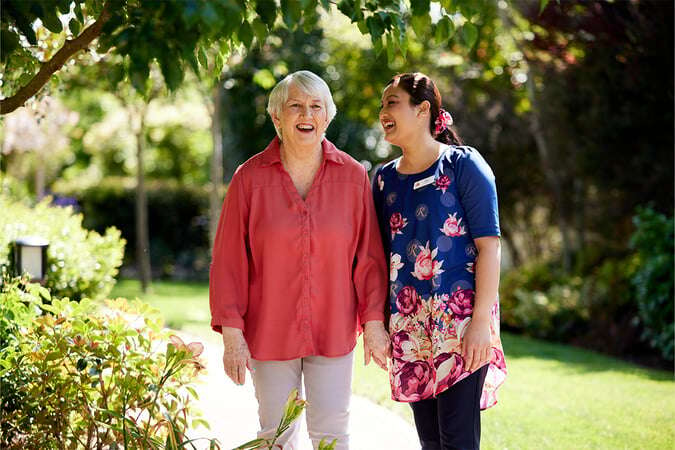When a person is diagnosed with dementia it can be difficult to know how best to support them while encouraging them to retain autonomy and independence. Cognitive decline, including loss of memory, speech and decision-making skills, often associated with a dementia diagnosis, will present at differing times and to differing degrees for each individual. Specialised dementia care environments focus on the unique needs of a person living with dementia and provide tailored treatments by professionals including dietitians, physiotherapists and speech therapists to support a person to live well with their diagnosis.
There are a number of things family members and caregivers can do to support a person living with dementia.
Understanding Dementia
Dementia is a general term used for symptoms which present as a result of disorders impacting the brain, rather than one specific disease. While there are various forms of dementia, the most common types are Alzheimer’s disease, Vascular dementia, Lewy body disease and Frontotemporal dementia. It is important to speak with a person’s doctor and medical specialists to learn about the specific type of dementia your loved one is experiencing. Medical professionals can help you to understand the progression, symptoms and challenges associated with different kinds of dementia which is integral to ensuring the person living with dementia receives informed and compassionate care.
Patience and Empathy
Patience and empathy are essential to the provision of good care. Supporting someone living with dementia can be extremely challenging as cognitive changes create unpredictable behaviours, aggression, and other emotions in a person. It is important to seek support and recognise that a person’s actions may be a response to confusion or frustration rather than an intentional attempt to upset you.
Effective Communication
When communicating with someone living with dementia it can be helpful to consider how you would feel if you struggled to communicate and what would help to put you at ease. While every person’s experience with dementia is unique, the use of verbal and non-verbal cues including eye contact, smiling, and nodding can assist with communication. Use clear and simple language, introduce one idea per sentence, be patient and allow time for a person to express themselves. It can be helpful to ask questions that require a ‘yes’ or ‘no’ response and to explain the relationship someone has to the person living with dementia when discussing a person who is not present.
Establishing Routine
Living with dementia can be a frustrating and confusing experience as cognitive changes make it difficult for a person to understand their diagnosis. Creating a routine can help to reduce stress and uncertainty. A routine offers familiarity in activities and schedules, enhancing a person’s sense of stability and confidence to interact with others and complete tasks.
Fostering a calm environment
A quiet living environment with familiar items including photos of people important to the person living with dementia, minimal clutter, and visuals ques like posters to orientate a person can significantly reduce stress. Supportive environments will enhance quality of life and independence for the person living with dementia.
Respecting Personal Preferences
As the cognitive impacts of dementia progress, a person’s ability to make their own decisions can be greatly impacted. This can result in a sense of a loss of self and independence. It is important to respect a person’s decisions and preferences whenever possible, even when it comes to something minor such as choosing what to eat for lunch. Including your loved one in the decision-making process ensures they can retain a sense of autonomy and dignity and their needs remain the key priority of the care they receive. Person-centered care considers a person’s cultural background, social and family connections, life history and interests to deliver optimal individualised care.
Family and caregiver self-care
Caring for a person living with dementia can be a privilege. However, it can also be a stressful, isolating and upsetting experience. Well-supported caregivers and family members are better equipped to be able to help a loved one living with dementia. Specialist dementia care and respite care can provide important opportunities for caregivers to rest and recharge and for a person living with dementia to have different social interactions. Specialist dementia and respite care can make a world of difference for individuals and families.


